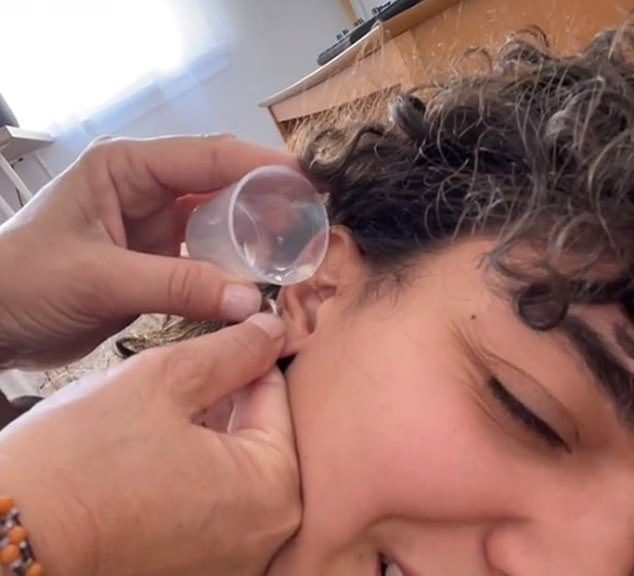A grandmother who was forced to spend six days trapped in a chair in a dirty emergency department in Wales described the experience as “inhumane”.
Val Griffiths, from Canton, Cardiff, was diagnosed with severe food poisoning in August and has been having trouble breathing ever since.
Her condition got so bad last week that her son took her to the emergency unit at the University Hospital of Wales (UHW) for expert help.
But she claims that she spent the entire stay, from Tuesday, September 27, to that Sunday, not in a bed but in an uncomfortable chair connected to an intravenous drip.
She said this area called the ‘IV room’ had no privacy, nor was she given any medication for 24 hours after staff ‘accidentally wiped her name off the board’.
Now back home, Ms Griffiths said she did not blame individual staff for their care, but added that the NHS seems ill-suited for its purpose.
“I’m not trying to criticize nurses as they are under almost constant pressure, but from my experience it felt like I was in a hospital in a third world country,” she said.
‘It is absolutely not fit for purpose. Inhumane is the word I would use to describe it. I have told my son that he will never take me there again.

This is where Val Griffiths, an elderly grandmother, was forced to stay during a six-day nightmare in the emergency unit of the University Hospital of Wales.

Now recovering at home, Ms Griffiths described the conditions she endured as “inhumane”.

The Cardiff and Vale University Board of Health, which runs the University Hospital of Wales (pictured), said they were “sorry to hear” that Ms Griffiths had a “bad experience in our care”.
Hospital parking fees scandal continues as analysis shows one site charges £76 A DAY
Hospitals are putting pressure on ambulance services by charging patients up to £76.80 a day to park, campaigners warned yesterday.
They said sky-high parking fees mean many ailing Britons can no longer afford to drive to A&E and rely on 999 vehicles.
The researchers looked at parking fees at 120 of the best hospitals in England.
They found that St Thomas’s Hospital in central London, opposite the Palace of Westminster, was the most expensive at £3.20 per hour, or £76.80 per day.
Seven of the ten most expensive car parks for a 24-hour stay were in the capital.
The most expensive outside of London was Addenbrooke’s in Cambridge, which charges £22, according to research by car dealership Motorfinity.
Guidance from the Department of Health says NHS hospitals can charge for parking, but prices must be “reasonable for the area”.
Trusts are required to offer free parking to some groups, including disabled patients and overnight parents of sick children.
Conservative MP Sir Mike Penning, who has campaigned against hospital parking charges, said: “The NHS is built on the principle that it should be free at the point of delivery and that should apply to motorists, whether they are patients or your loved ones who are visiting you in a time of need.
In one story, first reported by Wales Online, it was unclear why Mrs Griffiths was not offered a bed during her six-day ordeal.
Most cases of ‘corridor care’, where patients are cared for outside of designated ward areas, are due to overcrowding in hospitals.
It was also unclear if she relied on staff to feed her in bed, drink water and go to the bathroom, or if her family helped her.
Ms. Griffiths, who has severe arthritis in her spine and is recovering from a double spinal fracture, said she was given antibiotics through an IV drip when she was admitted to A&E.
But he added that as the department was incredibly busy, he feared mistakes were being made.
She said: ‘One day I didn’t get any observations, I didn’t have my medicine, my drip wasn’t replaced and I didn’t see a doctor. I was totally confused why this was happening.
“They have a board there with all the names of the patients and I could see that my name had been removed.
‘I checked with one of the nurses when I went for a walk, and then she turned on the computer and she could see it should have been there and added it back.
They then came in and did my obs right away and got my medication. That’s the kind of mistakes that are being made.
Ms Griffiths, who worked for Oxfam as the area manager for Wales, added that her legs swelled up a lot during the time she was on the unit sitting in a high-back chair.
It was not until the fifth day of his stay that he claims he was given a more comfortable reclining chair that the board of health had recently purchased.
‘They told me to raise my legs above my heart. Have you ever tried to do it sitting on an upright chair? I’m not young. I couldn’t believe what they were telling me.
On Saturday night, Ms Griffiths said one of the patients in the ‘IV ward’ was ‘clearly dependent on alcohol or drugs’ and that the hospital was so short-staffed that it relied on patients to prevent ripping the drip from his own arm.
“We had prevented her from taking this cannula out several times – a nurse can’t sit with it 24/7 – so we took it upon ourselves to intervene,” she added.
“We had two guys in the room with us who were probably in their 20s, and this woman put her hand down her pants and started masturbating in front of them, just disgusting.”
“At that point I told the nurses that I would be discharged if I didn’t move her.
‘Luckily she was moved, but who made the decision to put her in a room with us? She was not mentally well.
On Sunday, October 2, Ms Griffiths said the decision was made by staff to discharge her and not transfer her to a main hospital ward.
“They discharged 16 of us at one time, which seemed like a lot to me,” he said.
‘It seemed like they were just cleaning us up. At that time I just wanted to get out of there and go home. Now I am taking oral antibiotics, but my breathing is still not adequate.’
Ms Griffiths said she believes system-wide pressures on NHS Wales are causing terrible bottlenecks at A&E.
‘I think care in the community doesn’t exist. What happens then is that they can’t get people out of theaters, so it causes blockages at A&E and their staff have to deal with that.
“There is a clear lack of communication at A&E regarding what is going on with patients as they don’t have time to talk to them.
‘I spoke to one of the head nurses and asked her how morale was within the team. She could not answer me verbally other than with a too-smiling face.
The Welsh Health Inspectorate visited the A&E department at the University Hospital of Wales between June 20 and 22 and found it to be overcrowded, visibly dirty and unable to ensure the safety and dignity of patients.
In response to Ms Griffiths’ claims, a spokesperson for the Cardiff and Vale University Health Board said: “We are sorry to hear that Ms Griffiths recently had a bad experience while in our care.”
They added that they would welcome the opportunity to discuss the concerns raised by her directly.









